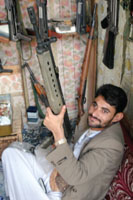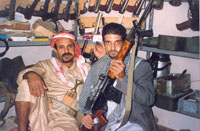
Peaceful minds at the ‘House of Peace’ [Archives:2007/1027/Reportage]
February 22 2007
 |
 |
Sheikh Abdul Rahman Al-Marwani plants a kiss on Ahmed Hussein Al-Kulaibi's forehead and following a fatherly embrace, Al-Kulaibi proudly walks down the road toward his village in his clean suit adorned with a Dar Al-Salaam pin.
Only a month ago, the 19-year-old Al-Kulaibi became the youngest volunteer in the Dar Al-Salaam family. He walked into the anti-gun and anti-revenge office in Sana'a wanting to see an end to the tribal conflict that's claiming the lives of his family members.
The conflict involving his Al-Haddah tribe near Dhamar is older than Al-Kulaibi. The 24 years of revenge fighting took his father's life 12 years ago and during the recent year of escalating violence, his uncle was killed.
“Now he will see that the organization can end these conflicts,” says Sheikh Al-Marwani, chairman of Dar Al-Salaam, an organization attempting to spread the “culture of tolerance and combat revenge.”
Meaning house of peace, Dar Al-Salaam formed in 1997 to bring a message of tolerance and Al-Marwani personally brings that message to warring tribes who want his assistance to end conflicts.
Dar Al-Salaam signs are at check posts along most Yemeni roads and its logo adorns water bottles; however, despite its symbol's visibility, the peaceful organization battles to get its message into traditional tribal life.
On this day, Al-Marwani is one of six men traveling and dressed in a suit. He's taking a trip to the gun market in Dhamar and has meetings planned between conflicting tribes.
Al-Kulaibi is dropped off and walks off to visit his sick mother. He's returning to his village for the first time since joining Dar Al-Salaam and it's his first time showing off the pin with the bold red line through a handgun.
Al-Kulaibi receives the first embrace of the day from Al-Marwani, but there are plenty more to come for the sheikh as he's about to enter tribal areas where he once was at home, but now finds those with a different, less peaceful, mentality.
A sheikh in sheep's clothing
Entering the Dhamar gun market, Al-Marwani walks with purpose. He walks by the fish sellers, light shops and past the hammam, leading his group of well-dressed men into the heart of the gun market.
Standing in the center of the small square, Al-Marwani is surrounded by shops filled with guns. Some are new guns and some are old, with prices hovering around $250 for a standard Kalashnikov. A couple of shops are able to one-up the Russian bloc arms by bringing out a brand new British rifle while another shows off its American Colt rifle. Handguns hang at the back of the shops.
All of these weapons don't seem to intimidate Al-Marwani as he takes this opportunity to embrace the gathering crowd.
Out of his pocket come Dar Al-Salaam pins, which become the must-have item in the center of a square filled with Yemen's must-have guns. The pins will come and go in the market, but the guns will remain.
“People believe they must have arms,” Al-Marwani says, leaving the market, “For men, arms are like gold to the ladies.”
When the sheikh was only 10, he learned a lesson that put him on the peaceful path. He was playing with a grenade, similar to those available this day in the Dhamar market, and the experience brought on his peaceful thinking. He joined the army, became an officer and got a firsthand look at how small disputes grow large. In an attempt to end such disputes while they were still small, Al-Marwani became a lawyer.
Now, as a sheikh, he walks a fine line between law and leader. In the market, Al-Marwani and the other Dar Al-Salaam representatives are the only men in suits. However, that changes as he leaves. The lawyer becomes a sheikh as he prepares for meetings with local warring sheikhs by changing into a crisp white thobe and putting on his jambiyya.
A governor and a sheikh
Al-Marwani is trying to find a final solution to a conflict between Dhamar's Garadon and Anis tribes. Upon entering Sheikh Mohammed Abdullah Al-Anisi Hamoud's home is the time for Dar Al-Salaam to bring peace.
Al-Marwani sits comfortably at the end of the mafraj and greets all who enter the room. Those he knows are embraced and there is time for everyone, but there's one guest he's waiting for today – the deputy governor. He needs to have the government involved. Dar Al-Salaam wants to move conflict resolution from the barrel of a gun into legal channels.
“People have to be more patient and people have to be more wise,” Al-Marwani says, now beginning to chew qat with the 25 other men in the mafraj.
There are two local police officers, each with rifles, and they are two of the only men meeting with the anti-gun group who have arms.
In the meeting with the deputy governor, Al-Marwani gets the word he's hoping for – the government will support whatever verdict he can obtain from the tribes because it also wants to see an end to the conflict.
A look at tomorrow
These conflicts keep Dar Al-Salaam busy today, but it is seeking ways to teach tolerance to a new generation.
Having young Al-Kulaibi walk into the office shows Al-Marwani that there's a change coming. He's one young man the group would like to send abroad for training, as it looks for youth who can represent Yemen and the organization.
“He's honest and trustworthy. We're teaching him to believe in other people and understand other religions,” Al-Marwani explains, “We are training him as a son in our family.”
Another member of the team lost his brother and sister seven years ago in a tribal conflict. These are the types of people the group is trying to reach with exhibitions, classes and theater workshops, as these youth represent the new generation of peace activists.
Not long ago, Al-Marwani met a young man heading in the opposite direction. He was on his way to Iraq and he thought that journey would take him to paradise, so Al-Marwani used Islam as a tool.
“I told him, 'You'll miss the way if you go that way,' and I showed him that this was the right way to bring about change,” he explains, adding that he uses the Qur'an to show that “conflicts don't fit in Islam.”
It was just one gun that didn't get used to kill the innocent, yet it helps Al-Marwani in his goal to make Yemen more secure.
Timeline to peace
“In Yemen, it's important to stop people from having guns,” he says, “We have to start the process.”
There are guns in many hands right now, but it's the hands of the two sheikhs near Dhamar that have Al-Marwani's attention this day.
Sheikh Hamoud, who is from the Anis tribe, invited Dar Al-Salaam to try to resolve the dispute with Garadon tribe. Only weeks ago, Hamoud's life was attacked, so at the end of the day, he gives Al-Marwani only two choices: Dar Al-Salaam must get the Sana'a government involved so the offending party will be arrested or else Hamoud will “take action.”
“It's shameful if he can't defend himself,” Al-Marwani notes, but he's happy Hamoud is giving him an opportunity to resolve the conflict peacefully.
Dar Al-Salaam will attempt to meet with government leaders, as well as write letters to President Ali Abdullah Saleh and the Ministry of Interior, but it will need more time.
According to Al-Marwani, sheikhs provide a challenge to peaceful negotiation because they only care about dignity, not the law; however, he will do whatever he can to end such conflicts.
“If they slaughter me and the people are at peace, then I'm happy,” he concludes.
——
[archive-e:1027-v:14-y:2007-d:2007-02-22-p:report]


